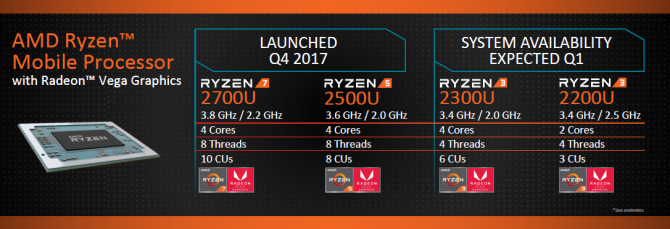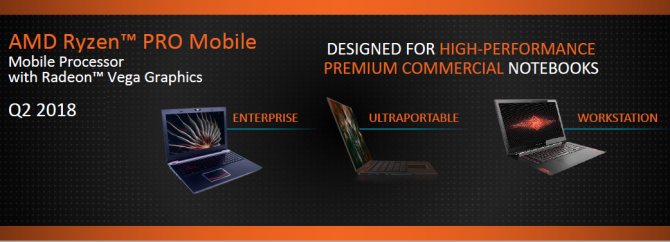AMD Launches Ryzen Pro Mobile, Ryzen 3 APUs: What You Need to Know
Sign up to receive The Snapshot, a free special dispatch from Laptop Mag, in your inbox.
You are now subscribed
Your newsletter sign-up was successful
AMD roared back in 2017, first on the desktop, with its new line of Ryzen processors based on its Zen microarchitecture, and then toward the end of the year on mobile, when the first notebooks appeared using Ryzen Mobile chips. At its Tech Day event on Saturday, January 6, just before CES 2018, AMD announced its plans to extend this newest line even further.
In addition to a new selection of lower-end chips aimed at the ultrathin laptop line Intel has dominated for years, it’s also inaugurating the new Ryzen Mobile Pro line to push those same advancements into the business realm.
The first products using these technologies will debut this year, with new Ryzen Pro Mobile laptops set to hit shelves in the next couple of months. Here’s what you need to know about what they are and what they may have to offer you.
How is AMD expanding its consumer Ryzen Mobile line?
The first laptops using Ryzen Mobile technology were announced in October 2017, with the Ryzen 7 2700U and Ryzen 5 2500U chips representing the company's high and mid-range offerings. Ryzen 7 takes on Intel Core i7 and Ryzen 5 competes against Core i5, but what about the lower end of the CPU market? AMD is introducing the Ryzen 3 2200U and the Ryzen 3 2300U, which should appear in less expensive systems.
What are the specs of these new chips?
The Ryzen 3 2200U is a 2.5GHz dual-core APU (AMD’s term for a processor that also has graphics) that can turbo up to 3.4GHz and has two physical processing cores and four threads; the 2300U has four cores and four threads, and starts at a lower 2-GHz clock rate (though its boost rate is the same). The 2300U also has double the CUs, or Vega graphics units, of the 2200U: six versus three. These don’t directly compare against any mobile chips Intel currently offers in its 8th Generation line, but they are positioned on the low end, much like Core i3.
Are there any new graphics technologies?
Vega Mobile is AMD’s update to its Vega GPU line. This discrete GPU is designed to deliver high-frame-rate AAA gaming in compact form factors. Because of this, AMD says it has low power usage and a 1.7mm Z-height (about half the height of the RX 580 mobile GPU). Like the original Vega, Vega Mobile uses the second generation of High Bandwidth Memory (HBM2).
What sorts of laptops will use these new APUs?
With these chips AMD is most directly addressing a segment of the market that’s less powerful but more portable than it did with its first Ryzen Mobile release. These include ultrathins, 2-in-1s, and other systems where the balance of capability and battery life is more important than raw processing power. AMD says these will even be used in gaming systems.
Sign up to receive The Snapshot, a free special dispatch from Laptop Mag, in your inbox.
Has AMD announced any specific laptop partners?
Not yet, though it seems safe to assume that many of the companies who put out ultrathin systems will at least offer a variant using the new Ryzen Mobile chips. But no manufacturers or product names were available at the time of publication.
When will the new chips start appearing in laptops?
Sometime during the first quarter of 2018. The official launch of the chips is scheduled for January 9, so it likely won’t be too long after that we see the first systems.
What is Ryzen Pro Mobile?
The Ryzen Pro family offers many of the same benefits of the Ryzen Mobile chips, including on-board Vega graphics, but with additional security and reliability features. These chips are intended for high-performance premium commercial notebooks, whether for enterprise or workstation use, or as standard business ultraportables.
What specs will Ryzen Pro Mobile have?
Ryzen Pro Mobile chips can have up to four cores and eight threads (per AMD, the first chip you’ll see in the enterprise space with such specs), with a boost speed as high as 3.8 GHz, and as many as 10 CUs; these are the top specs for the Ryzen 7 Pro line. With Ryzen 5 Pro you’ll see four cores and eight threads, a maximum boost speed of 3.6 GHz, and eight CUs; Ryzen 3 will deliver four cores and four threads, a top boost speed of 3.4GHz, and six CUs. The inaugural wave of Ryzen Pro Mobile chips will be based on the 14nm production process.
How powerful will Ryzen Pro Mobile chips be?
AMD claims that chips in this line will deliver better performance than comparable 8th Generation Intel Core chips. According to the company, the Ryzen 7 Pro Mobile 2700U chip will is up to 22% faster than the Core i7-8550U on the PCMark 10 Extended benchmark test and 39% better when using TrueCrypt 7.1a encryption software; AMD also touts the 2700U’s graphical prowess, stating it’s up to 125% better than the Intel chip on 3DMark 11.
What sort of battery life will Ryzen Pro deliver?
Claiming a performance-per-watt improvement over Zen chips of up to 270%, AMD says users can expect up 13 hours of battery life in regular usage scenarios and more than 9 hours of HD video playback. As always, real battery numbers depend a lot on usage, so we’ll report back once we’ve had an opportunity to test these laptops ourselves.
What security features may be found in Ryzen Pro Mobile?
In addition to a built-in AES 128-bit encryption engine, and support for Windows 10 Enterprise Security and fTPM or TMP 2.0, AMD has also implemented its GuardMI suite of security features for all Ryzen Pro Mobile chips. This allows for transparent secure memory encryption (which AMD says is a first in commercial notebooks), which can be used on the OS or applications without additional software changes or a major performance impact; a secure boot process, so your laptop is protected as soon as you power it on; and securing storage of trusted applications and real-time intrusion detection.
AMD also touts a “secure production environment” that begins on the assembly line, so you never have to worry about your Ryzen Pro system at any point along its journey to your hands.
What has AMD done about reliability on Ryzen Pro Mobile?
AMD says it is reassuring its customers about Ryzen Pro reliability through several methods. These include processor availability over a 24-month span, so companies can continue to buy the same laptops for a long time; 18-month image stability; commercial-grade quality assurance, with processor specifications that put reliability at the forefront; strong manageability, with implementation of the DASH manageability open standard; and a 36-month limited warranty to system manufacturers (three times that of consumer parts).
When will Ryzen Pro laptops be available?
Expect to start seeing laptops using Ryzen Pro Mobile chips in the second quarter of this year.
Laptop Guide
- Laptop Buying Guide: 8 Essential Tips
- The Best & Worst Laptop Brands
- Laptop Tech Support Showdown: Undercover Report
- Should I Buy a Chromebook? Buying Guide and Advice
- Laptops with the Longest Battery Life
- Chromebooks vs. Windows 10 Laptops: What Should You Buy?
- Why You Shouldn't Buy a Touch-Screen Laptop
- Out of the Box Tips: Set Up Your New Laptop Like a Pro
- The Best Time to Buy a Laptop
- Chromebook vs. Tablet: Which Should You Buy?
- Laptop Buying Tips for Students
- 10 Key Features to Look for in Your Laptop
- How to Buy a 2-in-1 Laptop Hybrid
- USB Type-C FAQ: Everything You Need to Know
- How to Get Rid of Your Old Laptop
- Laptop Warranties: What They Cover
- Which CPU is Right For You?
- Which Laptop Features Are Worth the Money?
- Gaming Laptop Buying Guide: Find the Right Rig
- 10 Reasons Why Consumers Should Buy Business Laptops
- Which MacBook is Right for You?
- 5 Things to Look For in Your Next Laptop Keyboard
- How to Configure Your Laptop: Specs That Matter
- Which Graphics Card Do You Need?
- The Perfect Laptop? Here’s What It Should Have
- Why 78 Percent of Laptop Screens Suck
- A Guide to Computer Ports and Adapters
- 13 Ways to Make a Slow Laptop Faster
- How to Tell If You Can Upgrade Your Laptop
- Laptop Locks Guide: Do You Need One?
- 10 Features You Can Skip to Save Money
When w

Matthew Murray is the head of testing for Future, coordinating and conducting product testing at Laptop and other Future publications. He has previously covered technology and performance arts for multiple publications, edited numerous books, and worked as a theatre critic for more than 16 years.



